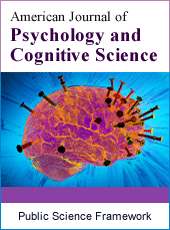American Journal of Psychology and Cognitive Science
Articles Information
American Journal of Psychology and Cognitive Science, Vol.4, No.2, Jun. 2018, Pub. Date: Jun. 14, 2018
The Relationship Between Metacognition Beliefs and Mental Health with Self-Efficacy of Sixth Primary School Students in Shiraz
Pages: 22-25 Views: 2237 Downloads: 799
[01]
Najmeh Dehghan Khalili, Department of Educational Sciences, Arsanjan Branch, Islamic Azad University, Arsanjan, Iran.
[02]
Firooz Rezaeian, Department of Educational Sciences, Arsanjan Branch, Islamic Azad University, Arsanjan, Iran.
Purpose of this study was to investigate the relationship between meta-cognitive beliefs and mental health with self-efficacy in elementary school students in Shiraz. The population consisted of all sixth grade elementary school students in the 3rd and 4th districts, selected by multi-stage cluster sampling method of 357 subjects. The measurement tools of this research included general health questionnaire, academic self-efficacy questionnaire and metacognitive beliefs questionnaire, which validity and reliability were estimated using Cronbach's alpha test. Descriptive statistics (mean...) and inferential statistics (Pearson correlation and multiple regression tests) were used to analyze the data. The results showed that the physical sign component was able to predict the academic self-efficacy variable and the rest of the mental health components were not able to predict academic self-efficacy. The component of positive beliefs about worries was able to predict the variable of academic self-efficacy and the rest of the meta-cognitive beliefs components were not able to predict academic self-efficacy.
General Health, Academic Self-Efficacy, Meta-Cognitive Beliefs, Students
[01]
Cheung P, Spears G. (1994). Reliability and validity of the Cambodian version of the 28-item General Health Questionnaire. Soc Psychiat Psychiatr Epidemil.; 29 (2): 95-99.
[02]
Dembo, M. H. (1996). Applying educational psychology. NewYork: Longman.
[03]
Dweek, C. S. (2000) Self theory: Their role in motivation, personality and development. Philadelphia: Thylor and Francis.
[04]
Foladvand Kh, Farzad V, Shahrara M, Sangari AA. Effectiveness social support, academic stress and academic self-efficacy on mental – physical health. 2008, pp: 81-93. [Persian].
[05]
Flavell (1979). Metacegnition and cognitive monitoring: a new area of cognitive developmental inquiry. American Psychologist.
[06]
Goldberg, D. and Williams, P. A. (1988) Users Guide to General Health Questionnaire (NEER-Nelson).
[07]
Haddadi Koohsar AA, Roshan R, Asghar Nejad Farid AA. A Comparative Study of the Relationship Emotional Intelligence with Mental Health and Academic Achievement in Shahed and Non-Shahed Students in University of Tehran. J Psych Educ 2007; 37 (1): 73-97 (Persian).
[08]
Hermann, Beth Ann (1990). Cognitive and Metacognitive Goals in Reading and Writing. In Duffy, Gerald G. (Eds), reading in the Middle School 2. (pp. 81-84). Newark, Delaware: International Reading Association.
[09]
Kunushimoi, A. (1992) Association of attitude toward mathematics with Self- efficacy, causual attribution and personality traits. Perceptual and Motor Skills, 75, 563-567.
[10]
Kim, Young- Ho. (2003) Correlation of mental health problems with psychological construction in adolescence: Final results from a 2-year study. International Journal of Narsing studies, 40, 115-125.
[11]
Maddux, James E. (2000). Self-Efficacy: The Power of Believing You Can. Handbook of Positive Pcychology. New York: Oxford University P Ress.
[12]
Molavi H. Validation factor structure and Reliability of the Farsi version of General Health Questionnaire 28 in Iranian students. Pakistan J Psychol Res. 2002; 17 (3-4): 87-98.
[13]
Montague. Ac. (1992). The multiple dimension of learning 3 ED. Enge; wood cliffs. NJ: Prentice-Hall.
[14]
Muris, P., Bogie, N., & Hoogsteader, A. (2002). Protective and vulnerability factors of depression in normal adolescents. Behavioral Research and Therapy, 39 (5), 555-565.
[15]
Omokhodion FO. Psychosocial Problems of Pre-Clinical Students in the University of Ibadan Medical School. Afr J Med Sci 2003; 32 (2): 135-138.
[16]
Pajares F, Schunk DH. Self and self-belief in psychology and education: A historical perspective. Improv Acad Achiev Impact Psychol Factors Educ. 2002; 3-21.
[17]
Paris SG, Cross, D. R, & Lipson, M. Y (1984). Informed strategies for learning: A program to improve children s reading awareness and comprehension. Journal of Educational Psychology, 76, 1239-1252.
[18]
Redmond B. Self-efficacy theory: Do I think that I can succeed in my work? Work attitudes and moti-vation 2010. Available from: https://cms.psu.edu.
[19]
Schoenfeld, A. (1985). Mathematical Problem Solving. San Diego, CA: Academic Press.

ISSN Print: 2381-7453
ISSN Online: 2381-747X
Current Issue:
Vol. 6, Issue 2, June Submit a Manuscript Join Editorial Board Join Reviewer Team
ISSN Online: 2381-747X
Current Issue:
Vol. 6, Issue 2, June Submit a Manuscript Join Editorial Board Join Reviewer Team
| About This Journal |
| All Issues |
| Open Access |
| Indexing |
| Payment Information |
| Author Guidelines |
| Review Process |
| Publication Ethics |
| Editorial Board |
| Peer Reviewers |


